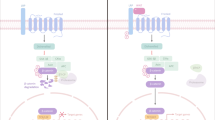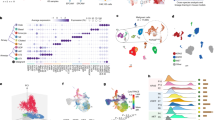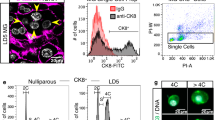Abstract
Transforming growth factor-β (TGF-β) regulates epithelial tissue homeostasis by activating processes that control cell cycle arrest, differentiation and apoptosis. Disruption of the TGF-β signaling pathway often occurs in colorectal cancers. Earlier, we have shown that TGF-β induces apoptosis through the transcription factor Smad3. Affymetrix oligonucleotide microarrays were used to identify TGF-β/Smad3 target genes that regulate apoptosis in rat intestinal epithelial cells (RIE-1). We found that TGF-β repressed the expression of the inhibitor of differentiation (Id) gene family. Knockdown of Id1 and Id2 gene expression induced apoptosis in RIE-1 cells, whereas overexpression of Id2 attenuated TGF-β-induced apoptosis. TranSignal Protein/DNA arrays were used to identify the hypoxia-inducing factor-1 (HIF-1) as a downstream target of TGF-β. HIF-1 is a basic helix-loop-helix protein, and overexpression of Id2 blocked HIF-1 activation by TGF-β. Furthermore, knockdown of HIF-1 blocked TGF-β-induced apoptosis. Thus, we have identified HIF-1 as a novel mediator downstream of Id2 in the pathway of TGF-β-induced apoptosis.
This is a preview of subscription content, access via your institution
Access options
Subscribe to this journal
Receive 50 print issues and online access
$259.00 per year
only $5.18 per issue
Buy this article
- Purchase on Springer Link
- Instant access to full article PDF
Prices may be subject to local taxes which are calculated during checkout







Similar content being viewed by others
References
Alliston T, Ko TC, Cao Y, Liang YY, Feng XH, Chang C et al. (2005). Repression of bone morphogenetic protein and activin-inducible transcription by Evi-1. J Biol Chem 280: 24227–24237.
Andres-Barquin PJ, Hernandez MC, Hayes TE, McKay RD, Israel MA . (1997). Id genes encoding inhibitors of transcription are expressed during in vitro astrocyte differentiation and in cell lines derived from astrocytic tumors. Cancer Res 57: 215–220.
Babyatsky MW, Podolsky DK . (1991). Growth and development in the gastrointestinal tract. In: Yamada T, Alpers DH, Owyang C and Powell DW (eds). Textbook of Gastroenterology. JB Lippincott Co: Philadelphia, pp 475–501.
Cao Y, Chen L, Zhang W, Liu Y, Papaconstantinou HT, Bush CR et al. (2007). Identification of apoptotic genes mediating TGF-beta/Smad3-induced cell death in intestinal epithelial cells using a genomic approach. Am J Physiol Gastrointest Liver Physiol 292: G28–G38.
Cao Y, Deng C, Townsend Jr CM, Ko TC . (2006). TGF-beta inhibits Akt-induced transformation in intestinal epithelial cells. Surgery 140: 322–329.
Choy L, Skillington J, Derynck R . (2000). Roles of autocrine TGF-beta receptor and Smad signaling in adipocyte differentiation. J Cell Biol 149: 667–682.
Conery AR, Cao Y, Thompson EA, Townsend Jr CM, Ko TC, Luo K . (2004). Akt interacts directly with Smad3 to regulate the sensitivity to TGF-beta induced apoptosis. Nat Cell Biol 6: 366–372.
Florio M, Hernandez MC, Yang H, Shu HK, Cleveland JL, Israel MA . (1998). Id2 promotes apoptosis by a novel mechanism independent of dimerization to basic helix-loop-helix factors. Mol Cell Biol 18: 5435–5444.
Gold LI . (1999). The role for transforming growth factor-beta (TGF-beta) in human cancer. Crit Rev Oncog 10: 303–360.
Gordan JD, Bertout JA, Hu CJ, Diehl JA, Simon MC . (2007). HIF-2alpha promotes hypoxic cell proliferation by enhancing c-myc transcriptional activity. Cancer Cell 11: 335–347.
Hasskarl J, Munger K . (2002). Id proteins—tumor markers or oncogenes? Cancer Biol Ther 1: 91–96.
Heldin CH, Miyazono K, ten Dijke P . (1997). TGF-beta signalling from cell membrane to nucleus through SMAD proteins. Nature 390: 465–471.
Kang Y, Chen CR, Massague J . (2003). A self-enabling TGFbeta response coupled to stress signaling: Smad engages stress response factor ATF3 for Id1 repression in epithelial cells. Mol Cell 11: 915–926.
Kim D, Peng XC, Sun XH . (1999). Massive apoptosis of thymocytes in T-cell-deficient Id1 transgenic mice. Mol Cell Biol 19: 8240–8253.
Kim HJ, Chung H, Yoo YG, Kim H, Lee JY, Lee MO et al. (2007). Inhibitor of DNA binding 1 activates vascular endothelial growth factor through enhancing the stability and activity of hypoxia-inducible factor-1alpha. Mol Cancer Res 5: 321–329.
Ko TC, Bresnahan WA, Thompson EA . (1997). Intestinal cell cycle regulation. In: Meijer L, Guidet S and Philippe M (eds). Progress in Cell Cycle Research. Plenum Press: New York, pp 43–52.
Kondo M, Cubillo E, Tobiume K, Shirakihara T, Fukuda N, Suzuki H et al. (2004). A role for Id in the regulation of TGF-beta-induced epithelial-mesenchymal transdifferentiation. Cell Death Differ 11: 1092–1101.
Kowanetz M, Valcourt U, Bergstrom R, Heldin CH, Moustakas A . (2004). Id2 and Id3 define the potency of cell proliferation and differentiation responses to transforming growth factor beta and bone morphogenetic protein. Mol Cell Biol 24: 4241–4254.
Lasorella A, Noseda M, Beyna M, Yokota Y, Iavarone A . (2000). Id2 is a retinoblastoma protein target and mediates signalling by Myc oncoproteins. Nature 407: 592–598.
Levy AP, Levy NS, Wegner S, Goldberg MA . (1995). Transcriptional regulation of the rat vascular endothelial growth factor gene by hypoxia. J Biol Chem 270: 13333–13340.
Ling MT, Wang X, Tsao SW, Wong YC . (2002). Down-regulation of Id-1 expression is associated with TGF beta 1-induced growth arrest in prostate epithelial cells. Biochim Biophys Acta 1570: 145–152.
Lofstedt T, Jogi A, Sigvardsson M, Gradin K, Poellinger L, Pahlman S et al. (2004). Induction of ID2 expression by hypoxia-inducible factor-1: a role in dedifferentiation of hypoxic neuroblastoma cells. J Biol Chem 279: 39223–39231.
Massague J . (1998). TGF-beta signal transduction. Annu Rev Biochem 67: 753–791.
Massague J, Blain SW, Lo RS . (2000). TGFbeta signaling in growth control, cancer, and heritable disorders. Cell 103: 295–309.
Nakajima T, Yageta M, Shiotsu K, Morita K, Suzuki M, Tomooka Y et al. (1998). Suppression of adenovirus E1A-induced apoptosis by mutated p53 is overcome by coexpression with Id proteins. Proc Natl Acad Sci USA 95: 10590–10595.
Nemetski SM, Gardner LB . (2007). Hypoxic regulation of Id-1 and activation of the unfolded protein response are aberrant in neuroblastoma. J Biol Chem 282: 240–248.
Nguyen KA, Cao Y, Chen JR, Townsend Jr CM, Ko TC . (2006). Dietary fiber enhances a tumor suppressor signaling pathway in the gut. Ann Surg 243: 619–625; discussion 625–7.
Norton JD . (2000). ID helix-loop-helix proteins in cell growth, differentiation and tumorigenesis. J Cell Sci 113 (Part 22): 3897–3905.
Norton JD, Atherton GT . (1998). Coupling of cell growth control and apoptosis functions of Id proteins. Mol Cell Biol 18: 2371–2381.
Parrinello S, Lin CQ, Murata K, Itahana Y, Singh J, Krtolica A et al. (2001). Id-1, ITF-2, and Id-2 comprise a network of helix-loop-helix proteins that regulate mammary epithelial cell proliferation, differentiation, and apoptosis. J Biol Chem 276: 39213–39219.
Sanchez-Elsner T, Botella LM, Velasco B, Corbi A, Attisano L, Bernabeu C . (2001). Synergistic cooperation between hypoxia and transforming growth factor-beta pathways on human vascular endothelial growth factor gene expression. J Biol Chem 276: 38527–38535.
Sanchez-Elsner T, Botella LM, Velasco B, Langa C, Bernabeu C . (2002). Endoglin expression is regulated by transcriptional cooperation between the hypoxia and transforming growth factor-beta pathways. J Biol Chem 277: 43799–43808.
Sanchez-Elsner T, Ramirez JR, Sanz-Rodriguez F, Varela E, Bernabeu C, Botella LM . (2004). A cross-talk between hypoxia and TGF-beta orchestrates erythropoietin gene regulation through SP1 and Smads. J Mol Biol 336: 9–24.
Semenza GL . (1999). Regulation of mammalian O2 homeostasis by hypoxia-inducible factor 1. Annu Rev Cell Dev Biol 15: 551–578.
Semenza GL, Nejfelt MK, Chi SM, Antonarakis SE . (1991). Hypoxia-inducible nuclear factors bind to an enhancer element located 3′ to the human erythropoietin gene. Proc Natl Acad Sci USA 88: 5680–5684.
Shih SC, Claffey KP . (2001). Role of AP-1 and HIF-1 transcription factors in TGF-beta activation of VEGF expression. Growth Factors 19: 19–34.
Siegel PM, Shu W, Massague J . (2003). Mad upregulation and Id2 repression accompany transforming growth factor (TGF)-beta-mediated epithelial cell growth suppression. J Biol Chem 278: 35444–35450.
Sikder HA, Devlin MK, Dunlap S, Ryu B, Alani RM . (2003). Id proteins in cell growth and tumorigenesis. Cancer Cell 3: 525–530.
Tanaka K, Pracyk JB, Takeda K, Yu ZX, Ferrans VJ, Deshpande SS et al. (1998). Expression of Id1 results in apoptosis of cardiac myocytes through a redox-dependent mechanism. J Biol Chem 273: 25922–25928.
Wang GL, Semenza GL . (1995). Purification and characterization of hypoxia-inducible factor 1. J Biol Chem 270: 1230–1237.
Wenger RH . (2002). Cellular adaptation to hypoxia: O2-sensing protein hydroxylases, hypoxia-inducible transcription factors, and O2-regulated gene expression. FASEB J 16: 1151–1162.
Wenger RH, Stiehl DP, Camenisch G . (2005). Integration of oxygen signaling at the consensus HRE. Sci STKE 306: re12.
Yokota Y, Mori S . (2002). Role of Id family proteins in growth control. J Cell Physiol 190: 21–28.
Zebedee Z, Hara E . (2001). Id proteins in cell cycle control and cellular senescence. Oncogene 20: 8317–8325.
Acknowledgements
We thank D Deng, Dr D Song and Z Chen for technical support; Dr H Guo for real-time quantitative PCR assay at the Real-Time PCR Core Facility, Sealy Center for Cancer Cell Biology, UTMB; Dr C Cox Jr and F Jimenez in the Department of Pediatric Surgery, UTHSC-Houston, and M Griffin in the Flow Cytometry and Cell Sorting Core Facility, UTMB, for flow cytometric analysis. E Figueroa and S Schuenke in the Department of Surgery, UTMB, for manuscript preparation. This study was supported by a grant from the Gastrointestinal Research Interdisciplinary Program at the University of Texas Medical Branch (YC), and Public Health Service Grants R01 DK060105 (TCK), P01 DK035608 (CMT and TCK) and P50GM038529 (TCK).
Author information
Authors and Affiliations
Corresponding authors
Additional information
Supplementary Information accompanies the paper on the Oncogene website (http://www.nature.com/onc)
Rights and permissions
About this article
Cite this article
Cao, Y., Liu, X., Zhang, W. et al. TGF-β repression of Id2 induces apoptosis in gut epithelial cells. Oncogene 28, 1089–1098 (2009). https://doi.org/10.1038/onc.2008.456
Received:
Revised:
Accepted:
Published:
Issue Date:
DOI: https://doi.org/10.1038/onc.2008.456
Keywords
This article is cited by
-
CXCR5+CD8+ T cells are a distinct functional subset with an antitumor activity
Leukemia (2019)
-
Downregulation of Id2 increases chemosensitivity of glioma
Tumor Biology (2015)
-
Breast cancer anti-estrogen resistance 3 inhibits transforming growth factor β/Smad signaling and associates with favorable breast cancer disease outcomes
Breast Cancer Research (2014)



